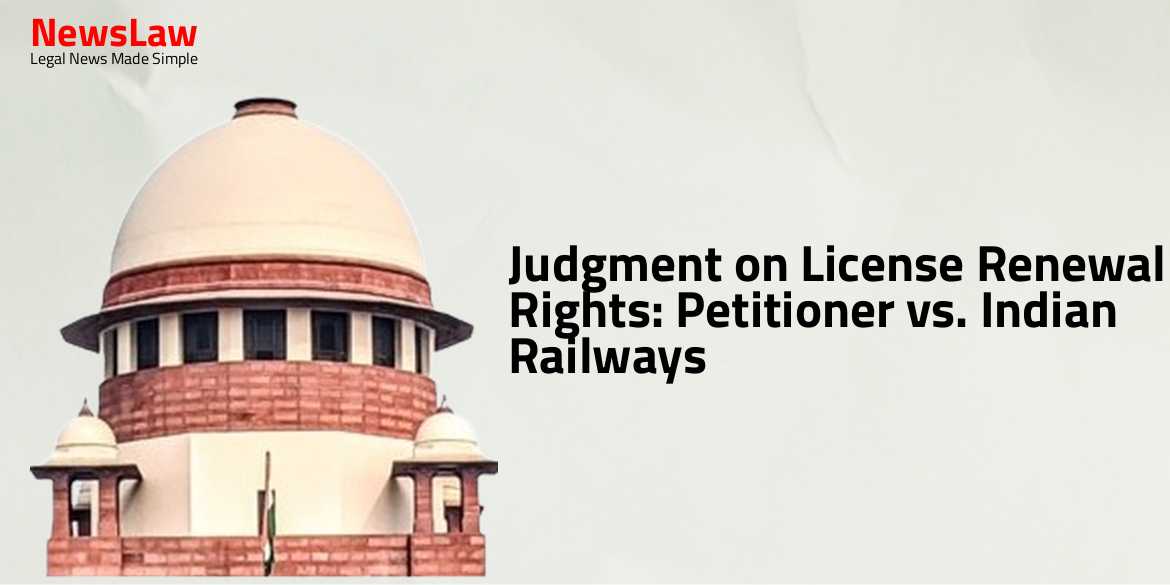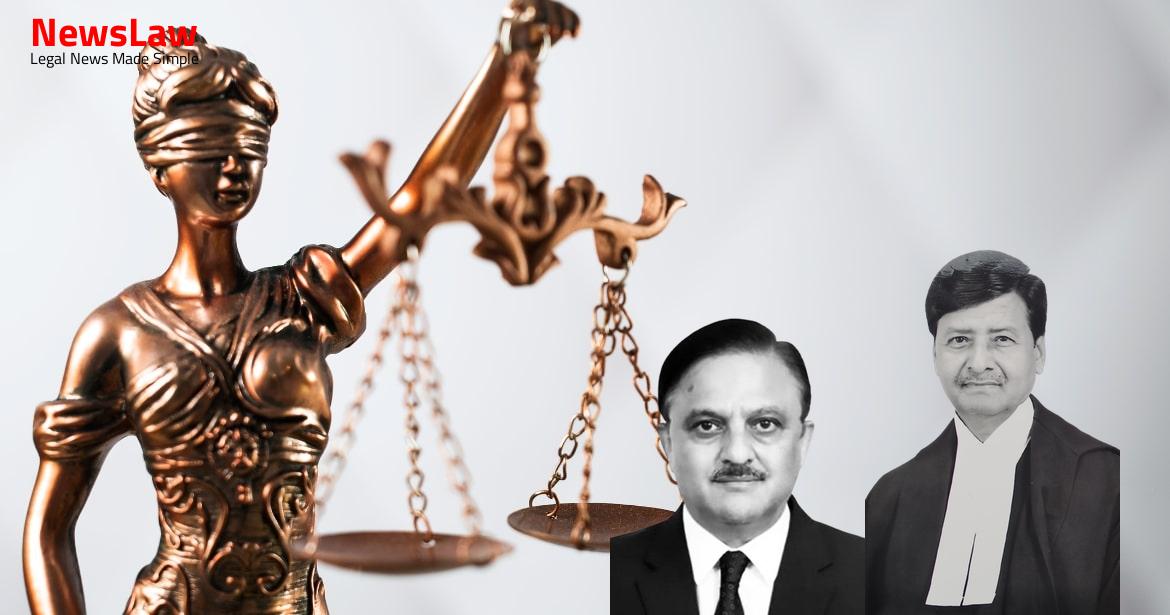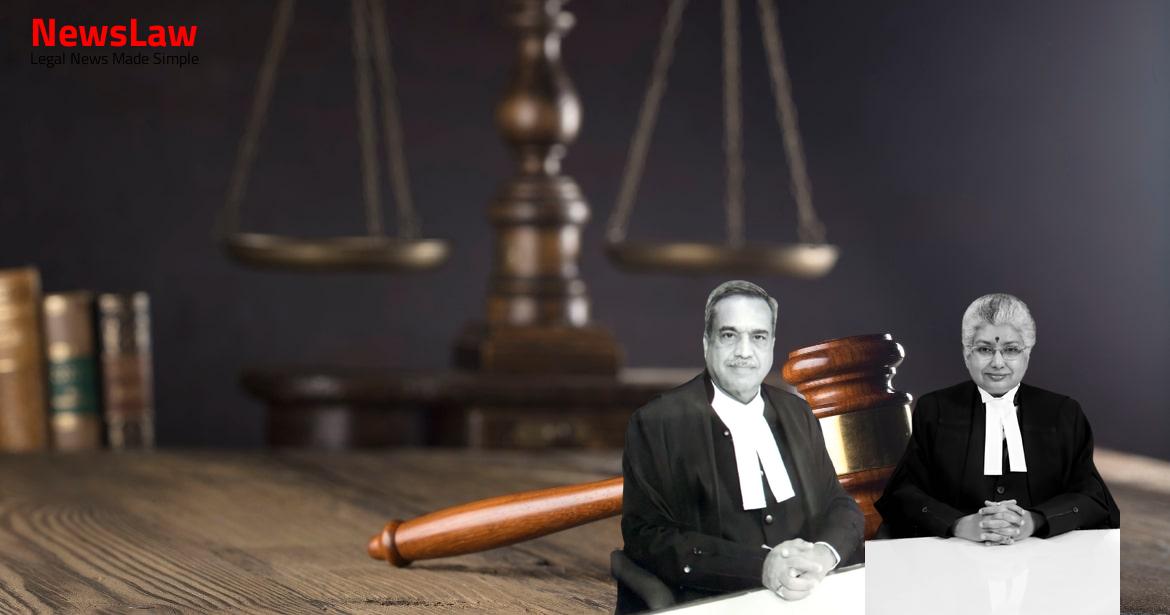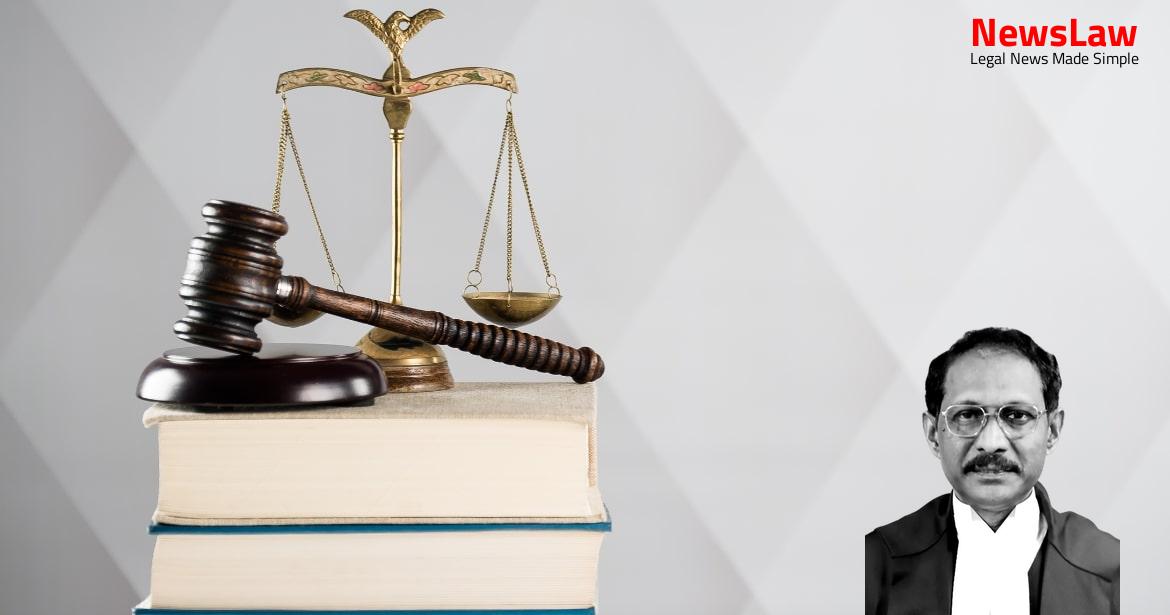Explore the recent ruling by Delhi High Court in the case involving the Petitioner challenging Indian Railways’ policies on license renewal. Discover the key legal analysis and arguments presented in the judgment to gain insights into the decision-making process.
Facts
- Petitioner no.1 was forced to convert stalls/trolleys to MPS in 2017 due to the 2017 Policy.
- Due to Covid-19 lockdown, the tenure of the petitioners’ licenses was extended until 27.02.2023 by the respondent.
- Petitioner no.2 has a Master License Agreement dated 29.10.2021 with no extension or renewal clause.
- Petitioner no.3 has a Master License Agreement dated 17.08.2020.
- Various agreements confirm the license arrangements between the petitioners and the respondent.
Arguments
- The petitioners argue that they have a legitimate expectation for license renewal throughout their lifetime and for future generations.
- They contend that Clause 5 of the 2017 Policy is unconstitutional as it eliminates the right of renewal and forces existing licensees to compete with larger companies.
- Petitioners claim that they were coerced into signing the new policy which did not allow for renewal.
- They assert that the licenses should continue to be governed as per past practice before the 2017 Policy.
- Petitioners rely on previous judgments to support their arguments.
- They argue that the licenses of small catering units are being renewed as per a Supreme Court judgment, but the licenses of small stalls/trolleys are not being renewed, which they deem arbitrary and a violation of rights.
- Petitioners are challenging the conditions of the policy just before their licenses expire, which the respondents argue is not a valid claim.
- The 2017 Policy is upheld by the respondents as legal and non-discriminatory, citing a Karnataka High Court judgment in support.
- The respondents point out that the 2017 Policy clearly states no renewal or extension of licenses, making the comparison to the South Central Railways case irrelevant.
- The petitioners’ actions under the 2017 Policy prevent monopolization and provide opportunities for livelihood for others during tendering.
- Petitioners argue that an extension due to Covid-19 and fee reduction should apply to them as well.
- Various legal cases are referenced by both sides to support their arguments.
- The petitioners claim coercion and unequal bargaining power in converting their stalls to MPS units under the 2017 Policy.
- The respondents maintain that the expectation for license renewal is not guaranteed and each category undergoes a tendering process.
- The respondents argue there is no fundamental right to trade at a specific public space, subject to reasonable restrictions.
- The jurisdictional aspect of the case is raised, citing exclusive jurisdiction clauses in license agreements and an arbitration clause in the 2017 Policy.
- The 2017 Policy is presented as balancing livelihood and equal opportunity rights, aligning with the Supreme Court’s stance.
- The petitioner cannot put the clock back after enjoying the benefits of the contract till its completion.
- The petitioner’s contract is not under the Catering Policy but a different policy.
- The petitioner’s contract was for a period of five years and non-renewable.
- The petitioner cannot rely on a judgment related to Catering Policy as it is not applicable to their case.
Analysis
- The judgment discusses the reservation percentages in different categories as per the 2017 Policy, including Scheduled Castes, Scheduled Tribes, Other Backward Classes, and Minorities.
- It highlights the sub-quotas for freedom fighters, war widows, widows of Railway employees, physically and mentally challenged individuals, thereby rectifying disparities in opportunities.
- The concept of Force Majeure clause application for catering and vending contracts during lockdown is emphasized, irrespective of agreements having this clause.
- The judgment addresses the revocable nature of licenses under the Transfer of Property Act, stating that licenses can be revoked by the grantor except under specific circumstances.
- It mentions the petitioners’ voluntary conversion of their stalls/trolleys to Multipurpose Stalls (MPS) and the extension of license periods due to Force Majeure events like the Covid-19 lockdowns.
- The argument against perpetually renewing licenses is discussed to uphold equality of opportunity and prevent inhibitions on fresh financial/public participation models in railways.
- The judgment dismisses the claim of a ‘legitimate expectation’ for license renewals and clarifies the procedure for license extensions based on the 2017 Policy terms.
- It concludes by stating that petitioners cannot demand renewal or extension contrary to the policy guidelines and express terms of the Master License Agreement.
- The extract from the judgment states the relevant points.
- The specific part discusses the legal analysis related to the case.
- These points are crucial for understanding the court’s decision.
- The summary in JSON format will help in categorizing and reviewing the information effectively.
- Under Article 226 of the Constitution of India, the court cannot delve into the intricacies of factual situations at each railway station to act as an appellate authority regarding extension granted to individual licensees.
- Mandamus cannot be sought to compel the enactment of new laws or framing of rules by the respondents.
- A Mandamus is applicable for enforcing fundamental rights, statutory rights, or fundamental duties related to these rights.
- Legitimate expectation does not always guarantee relief, as it can be negated by public interest, policy changes, or other valid reasons.
- No public body has the authority to arbitrarily decline license renewals unless there are compelling legitimate reasons.
- The judicial review of a policy decision is distinct from issuing a Mandamus to frame policy in a specific manner.
- The decision in Brahmputra Metallics and Rachna v. Union of India emphasize the difference between policy review and Mandamus application.
- The Karnataka High Court, in Gulfeeza Begum v. Union of India, rejected a challenge to the 2017 Policy citing similar grounds.
- The Supreme Court in Rajasthan State Industrial Development & Investment Corporation case affirmed the principle of estoppel in certain situations.
- Individual license agreements and the 2017 Policy contain an arbitration clause for grievances related to Covid-19 situation or claims for damages.
- Petitioners can invoke the arbitration clause for issues related to extension or damages.
- Formal execution of the license agreement does not impact the applicability of the arbitration clause.
Decision
- Existing bookstalls, trolleys, and chemist stalls have the option to convert to Multipurpose Stalls (MPS) by paying the required license fee.
- If existing stalls do not opt for conversion, they can continue till the current agreement expires.
- New MPS will be allotted by Zonal Railways after the current agreement period ends.
- Petitioners have been granted a period of 3 months to vacate stalls after the extended license period.
- The Multi-Purpose Stall Policy applies immediately and supersedes previous policies.
- Existing licensees were given two options: convert to MPS for a 5-year tenure or continue with existing stalls till agreement expires.
- All pending applications are disposed of.
- Rights and remedies of petitioners regarding license renewal are kept open.
- The petitions are dismissed as there is no merit.
- Petitioners have requested conversion of their stalls/trolleys to MPS.
Case Title: URMILA DEVI & ORS. Vs. UNION OF INDIA & ORS. (2024:DHC:4452)
Case Number: W.P.(C)-2501/2023



